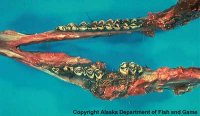|
|
| |
| Causative Agent |
-
Lumpy jaw is the result of an infection of the jawbone with the
bacteria, Actinomyces bovis.
-
A. bovis
is normally
found in the mouths of healthy animals.
-
Bacteria
may enter small wounds in
the mouth, caused by tooth eruption or by coarse feed.
|
| Images |
|
Click on
image to
enlarge. |
 |
|
Swelling of the jaw bone
subsequent to bacterial infection causes the formation of
conspicuous "lumps". |
|
| Distribution |
|
Geographic and Seasonality: |
-
Can occur throughout the year and throughout BC.
|
|
| Hosts, Transmission and Life
Cycle |
-
Occasionally found in wild
ungulates such as white-tailed deer (Odocoileus
virginianus), mule deer (O.
hemionus), moose (Alces
alces), caribou (Rangifer
tarandus) and mountain sheep (Ovis
canadensis).
-
This disease does not normally spread from animal to
animal, but draining wounds can spread
bacteria on
common feed sources.
|
|
| Signs and Symptoms |
-
Once
bacterial infection is established,
bacterial by-products break down
existing bone and promote the growth of new bone; consequently,
affected areas of the jaw expand forming lumps or thickened areas of
bone, honeycombed with tiny
abscesses.
-
Tissues within the mouth may
become swollen and there can be spread to nearby areas of the mouth.
-
Difficulty chewing.
-
Tooth loss and impaction of
feed usually occurs in affected areas.
-
Other than
lesions in the mouth, animals may
appear healthy but are often thin since jaw
lesions may interfere with the
ability to eat.
|
| Meat Edible? |
-
Affected areas of the jaw should not be consumed; otherwise, the rest of
the carcass is suitable for human consumption.
|
| Human Health Concerns and
Risk Reduction |
-
Although lumpy jaw cannot be contracted from animals, care should be
taken not to cut into the swellings of the jaw as
pus can spread and contaminate
other parts of the carcass.
|
| Samples for Diagnosis |
-
Lower jaw and surrounding tissue.
|
| Further Reading |
-
Alaska Department of Fish and Game – Lumpy Jaw
-
Wobeser G. 2001. Actinomyces and Arcanobacterium
infections. Pp. 487-488 in E.S. Williams, I.K. Barker (eds.),
Infectious Diseases of Wild
Mammals. 3rd Ed. Iowa State University Press. Ames, IA.
-
Elkin B., Zamke R.L. 2001.
Common Wildlife Diseases and
Parasites in Alaska. Alaska Department of Fish and Game.
Anchorage, AK.
|
|
|
